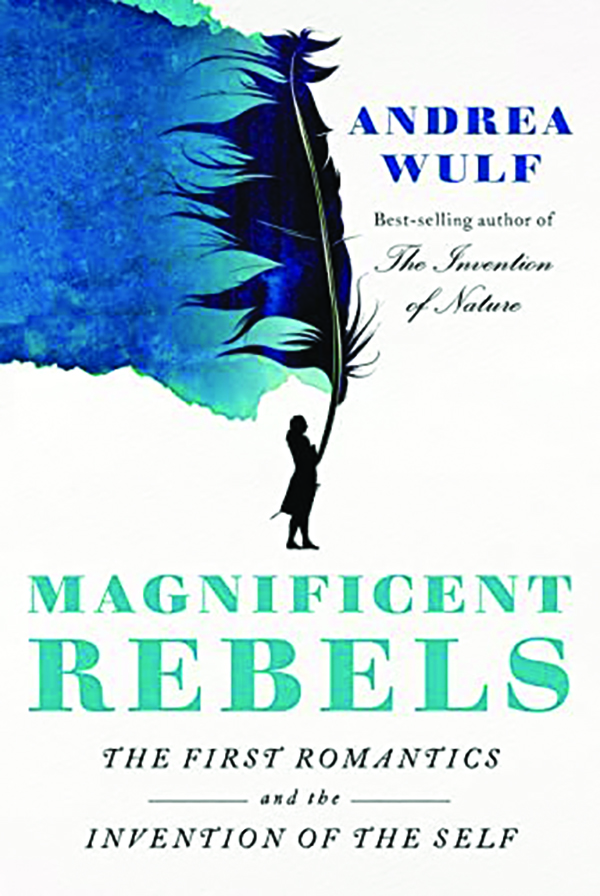
The ‘Ich’ factor
Charlotte Allen
Some of the German names are familiar, if only as cultural-literacy touchstones with long lines of intellectual influence: Immanuel Kant, Georg Wilhelm Friedrich Hegel. Other names you might dimly remember from your college philosophy and European literature survey courses: Johann Gottlieb Fichte, Friedrich Schlegel, Novalis (his pen name, as his given name was Friedrich von Hardenberg), Ludwig Tieck, Friedrich Schelling. Still other names — Johann Wolfgang von Goethe and his protege, Friedrich Schiller — are household words outside Germany mostly because their now-little-read dramatic masterpieces (Faust by Goethe, Wilhelm Tell by Schiller) became the basis of perennially popular operas composed by the likes of Gounod, Donizetti, Verdi, and Rossini. Andrea Wulf’s Magnificent Rebels, a group biography of these important but hazily perceived 18th- and early 19th-century Germans, provides faces for the famous names.

In case you’ve always wondered what Hegel (1770-1831) looked like, Wulf supplies a contemporary portrait of the puffy-eyed but preternaturally alert-looking philosopher as part of a large and expertly chosen collection of engravings, paintings, drawings, and maps that adorn her text. As she quickly establishes, not only were these famous figures real human beings with human ambitions, rivalries, foibles, and love interests, but they also all either knew each other personally or were removed by a single degree of separation. All of them lived or regularly sojourned at various times between 1789 and 1807 in Jena, then a sleepy university town of about 4,500 inhabitants on the Saale River in Saxony, about 12 miles east of Weimar, Goethe’s home base. Wulf dubs this group “the Jena Set.”
The lone figure without an explicit Jena connection was Kant (1724-1804), who never left his native city of Königsberg in East Prussia (now Kaliningrad, a Russian exclave between Poland and Lithuania). But Fichte (1762-1814), a ribbon-weaver’s son who had studied theology at the University of Jena during the 1780s, was a devotee of Kant. In 1792, at age 30, Fichte anonymously published a book, An Attempt at a Critique of All Revelation, written in a dense, nearly unintelligible (and thus Kantian) style that seemed to continue Kant’s famous treatises Critique of Pure Reason and Critique of Practical Reason and was widely believed to have been written by the now-elderly Kant himself. Indeed, Kant gave his blessing to Fichte’s book, which catapulted the younger philosopher’s reputation. Fichte named his eldest son Immanuel in Kant’s honor. In 1794, Fichte was invited to join the Jena faculty, even though he had no formal academic degree, where his lectures attracted hundreds of students.
In Wulf’s view, Fichte’s philosophy was the linchpin of what came to be known as Romanticism, the self-fixated ideology of the intellectuals of the early 19th century, not just in Germany but throughout the West. Fichte, and also eventually Hegel, subscribed to a philosophy, “transcendental idealism,” that had its origins in the writings of Kant. The latter theorized that external reality could not be known except as modulated through the subjective human consciousness. Fichte took Kant a step further and argued that there was no such thing as independent external reality, but, rather, that the subjective human consciousness, the “Ich” (the German word for “I”), essentially created, as well as understood, the external world via its own reflective and experiential activity.
The “Ich” was the subjectively created and subjectively understood self. As Wulf writes of Fichte: “He imbued the self with the most thrilling of all ideas: free will. … And this radically new concept of an unfettered self carried with it the potential for a different life. A person ‘should be what he is,’ Fichte told his students at Jena, ‘because he wants to be it and is right to want to be it.’” The French Revolution, upending centuries of traditional religious and political notions of authority and morality, unfolded during the Jena Set’s heyday and became its ideological lodestone.
Fichte’s philosophical Romanticism spilled out into literary Romanticism, with its glorification of heroic individualism, nature, and intense, untrammeled feelings and emotion. Goethe had been the forerunner. His 1774 novel The Sorrows of Young Werther, about an artist who kills himself after the girl he loves marries another, made Goethe an international celebrity. Goethe encouraged Schiller to turn from philosophy to playwriting and poetry. Friedrich Schlegel and Tieck, who both resided in Jena, along with Novalis, Tieck’s close friend and frequent Jena visitor, became the leading poets and essayists of early German Romanticism.
Another poet-friend of Schiller’s, Friedrich Schlegel’s older brother August Wilhelm Schlegel (1767-1845), who lived in Jena from 1796 to 1801, produced what are still considered iconic translations into German of Shakespeare’s plays. The Romantics idolized Shakespeare. His plays had been considered sprawling and barbarous during the 18th century, when Enlightenment worship of reason and the polished French neoclassicism of Racine and Corneille dominated critical thinking about literature and drama. But the Jena Set, especially Novalis, considered Shakespeare a “natural genius” who celebrated “the creative imagination,” Wulf writes.
The central figure in Wulf’s book, however, is Caroline Böhmer-Schlegel-Schelling (the surnames are those of her three successive husbands). A much-admired beauty with masses of tumbling dark curls, daughter of the distinguished University of Göttingen Hebrew scholar Johann David Michaelis and a free spirit, Caroline had moved to Mainz after the death of her first husband. She became entranced by the French Revolution. She got pregnant in a one-night fling with a French officer during a brief French occupation of the city in 1793 and a few months later was imprisoned for her political beliefs after Prussia recaptured Mainz. August Wilhelm Schlegel arranged for her release, and in 1796, she married him and moved with him to Jena.
It was an open marriage. August Wilhelm pursued a series of infatuations, while Caroline carried on with Schelling, 12 years her junior and a Fichte protege in philosophy at the university. In 1803, she divorced August Wilhelm and married Schelling. But meanwhile, she was a formidable intellectual and social presence in her own right, collaborating with August Wilhelm on his Shakespeare translations while playing hostess to the Jena Setters who gathered daily at their house for lunch and stayed overnight for long periods of time.
Eventually, they all left Jena, lured away by personal ambition, amorous interests, and more appealing university positions elsewhere. The Schlegel brothers and Schiller launched rival literary magazines and quarreled — and in 1799, Goethe persuaded Schiller to move to Weimar. That same year, Fichte was dismissed from the Jena faculty for atheism, a serious offense in Saxony, whence Martin Luther had launched the Protestant Reformation.
The last to go was Hegel, who had joined the Jena faculty in 1801 at Schelling’s instigation. Napoleon was pushing the changes wrought by the French Revolution and its ethos of enforced modernity relentlessly eastward. On Oct. 14, 1806, he decisively defeated the Prussian army in the Battle of Jena that dissolved the Holy Roman Empire. French troops trashed the city, looting, smashing, and burning everything they saw. Hegel’s sole manuscript of his masterwork, The Phenomenology of Spirit, survived only because he had placed it on the last stagecoach leaving town before the battle began. Hegel embraced Napoleon as a harbinger of future universal democracy (the “end of history” that was later used by Francis Fukuyama as the widely misunderstood book title), but he needed money, and the university was in tatters. He left Jena for a newspaper-editing job in Bamberg in 1807.
The Jena Romantics specifically influenced a host of British Romantic writers, including Wordsworth and Coleridge, as well the 19th-century American Transcendentalists Emerson and Thoreau. But their ethos of the “unfettered self” unmoored from traditional morality and their notion of all things, including one’s own identity, as determined subjectively seems actually to have become universal. If you wonder why everyone obsesses over identity these days, blame Fichte and his “Ich.”
Charlotte Allen is a Washington writer. Her articles have appeared in Quillette, the Wall Street Journal, USA Today, and the Los Angeles Times.
